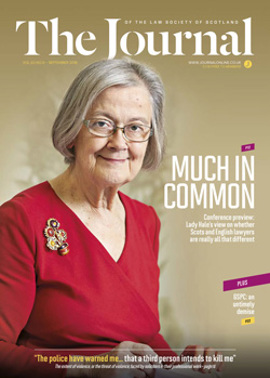GSPC: eulogy for a friend

GSPC is no more. Glasgow Solicitors Property Centre has gone into liquidation after 24 years, and its assets taken over by ESPC – its Edinburgh opposite number – in a sad but finally unavoidable situation.
The creation and development of GSPC is an interesting case study. It was brought into being to disrupt the referral practices of estate agents to selected solicitors who were regarded, rightly or wrongly, as being too close to them. The general public saw the old Glasgow Herald newspaper property pages, estate agency windows, and hunted For Sale boards in gardens and tenement windows. As a punter, you bought and sold houses through estate agents. Lawyers? Yes, something called conveyancing – don’t understand it, do I need it? OK, let’s just go with the solicitor recommended by the estate agent. Agents held the ring and could to a great extent dictate where the client was sent, and, more sinisterly sometimes, the fee. Conveyancers did all the complicated stuff for a moderate fee, while estate agents got the cream and a hefty percentage commission for being (literally in those days) just a shop window.
ESPC was already going, and a great success, though timing is everything. Edinburgh did not then have the panoply of brash high street agents and frontages, so it was an easier sell to clients that their trusted Capital solicitor would also do the marketing through its umbrella organisation – to the highest ethical standards.
Glasgow came later, playing catch-up. But it did that very well and made good ground over the years. So far so good.
Beaten to the web
Fast forward to the internet age. Just as we began to be offered holidays, cars, insurance, electronica through the web, a few bright sparks realised that property is really just a commodity: a dear one, but a thing to be bought and sold, and therefore advertised – online. Let me say here and now that there are some solicitors and firms who were and are at the cutting edge of tech change and innovation, but then, and I think now, the exception rather than the rule.
I have written before that people generally hate change, and solicitors seem to specialise in that negativity, but the bottom line is that it took too long with too many obstacles to overcome to get alongside the Rightmoves and the Zooplas, and by the time GSPC had a hot’n’happening web offering supported and appreciated by member firms, the big portals were already household names and had taken over as first port of call from the old high street agent.
Indeed on that note, all of the usual estate agency names have lost market share and money. A personal client of mine who works for one of the national chains was bemoaning this very problem to me, and the arithmetic is clear. The online agents (many of whom are absolutely awful no matter how much TV advertising they pay for) have diluted the market, and the national web companies have become the causa sine qua non for sellers, buyers and indeed agents, so that nothing moves without it having been on the internet portals who have no loyalty to solicitors. Don’t blame the public for voting with their mice and mobiles. We have no God-given right to the business, and have frankly failed in persuading enough clients of the benefits – and there are many – of having estate agency and conveyancing under the one roof.
A future for SPCs
What has the GSPC ever done for me? Lots. It established a solid platform for its law firms to protect conveyancing practice from being bled away by the local estate agent; it allowed us to dip our toe into property marketing supported by a professional and dedicated personnel at head office; it provided training, excellent marketing materials and in due course a first-rate website – plus a regular house newspaper that advertised all GSPC properties, read by hundreds of thousands of people locally.
In principle, the offering should be first choice for people selling property and a lure for those buying. The solicitor is essential to the process of moving house. He/she is regulated to the highest ethical standards by the Law Society of Scotland, trusted with all the money, expert in the contractual and title matters that are essential to property owning and able to fight the client’s corner. On top of that they can market the house, advertising it on the hugely popular GSPC websites both desktop and mobile, and all for a price that is at least competitive with the big names.
Many clients have understood that. Firms certainly have. The stats show, on an exercise recently done in Edinburgh, that homes are likely to sell for higher prices through the SPC than any other way. The satisfaction rates are very high for those clients who have used the one-stop shop. There is nothing wrong with the model.
Indeed the future still beckons, and it has the letters SPC written high, wide and handsome. In the last few years there has been and is a growing movement towards establishing a national Solicitors Property Centre. Once in place, gathering together most or all the area SPCs under one roof and on one website (Stop press! The website already operates – check out www.sspc.co.uk), that SPC will in due course be able to outshine those Rightmoves and the Zooplas. Properly supported by member firms and catching the public imagination, it will consolidate and enhance the offering, putting the conveyancer/estate agent where we belong. Looking after the clients’ best interests and being effective and profitable are not mutually exclusive – they evidence a healthy market place and a dynamic profession.
From the ashes
The problem has essentially been one of timing. Most in the SPC movement see the sense in a national offering. Sadly, it takes forever to get all the ducks in a row, and centralisation will cost jobs and assets currently operating locally in SPC premises – though crucially not in law firms. A national centre that works can only increase business, needing more staff and resources in every firm. But that’s not yet where we are. A few big local firms left the GSPC, unable to see that future, sticking to the problems of the present – their problems, not GSPC’s – and given the nature of the business as a members’ organisation, brought the house down with them.
As for my firm, sorry as I am that GSPC has fallen – and front and centre some excellent, loyal and hardworking staff have lost jobs – I have every faith in the ESPC new offering. I did a straw poll with clients and others as to what the G and the E mean before the SPC. No more than 1 in 15 could tell me. The E nowadays could mean Everywhere, or just E as in e-bay (Electronic?). That’s the online world we now live in. Your iPad from Amazon didn’t originate at a river in South America, it was delivered from Dunfermline.
This article is not written on behalf of GSPC as was, or ESPC as is, but from a personal perspective. The opinions are mine. But I am clear in my head and in the experience I have gone through. GSPC has done great work, helped to blaze a trail. From its ashes something bigger will undoubtedly arise.
In this issue
- Confidence restored: internal investigations and legal privilege
- Court reforms: still an unknown quantity
- Ruled out of court?
- Uncovering the environment (1)
- Medical death: a case to answer
- Reading for pleasure
- Opinion: Kerry Trewern and Rhona McNair
- Book reviews
- Profile: Ryan McCuaig
- President's column
- Developing digital services
- People on the move
- Leading judgment
- Health check
- Open to attack
- Claims: beating the trigger
- Storage: time for digital
- GSPC: eulogy for a friend
- Relevant persons: a challenge
- New specialist land registration practice launches
- Good enough reason?
- Copyright: underpinning control
- Writing means writing
- Rent moves: two crucial hoops
- Debtor wins in policy decision
- Scottish Solicitors' Discipline Tribunal
- KIR: the time bomb explodes
- The guideline goal
- GC NextGen: a network for you?
- Your Law Society of Scotland Council members
- Public policy highlights
- Double boost for Society's AML team
- Ask Ash
- Practice rights and the impact of Brexit: working in the EU
- Acting as notary: what do I need to know?
- Engagement letters: a practical approach
- Uncovering the environment
- Paralegal pointers






